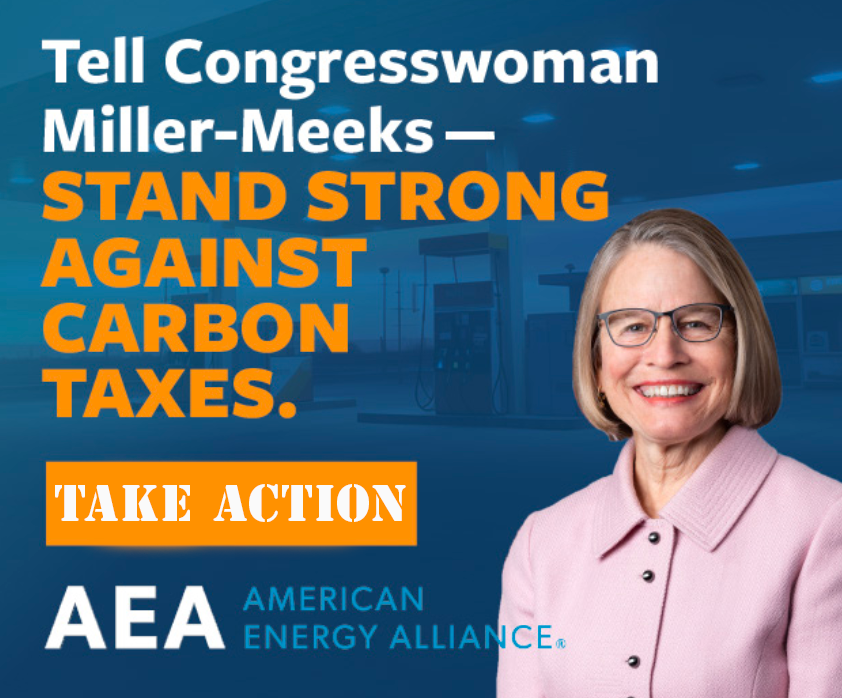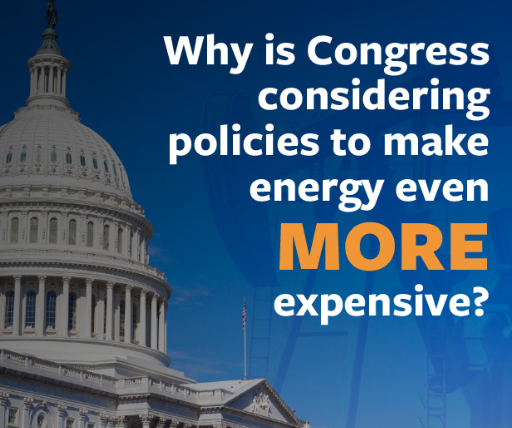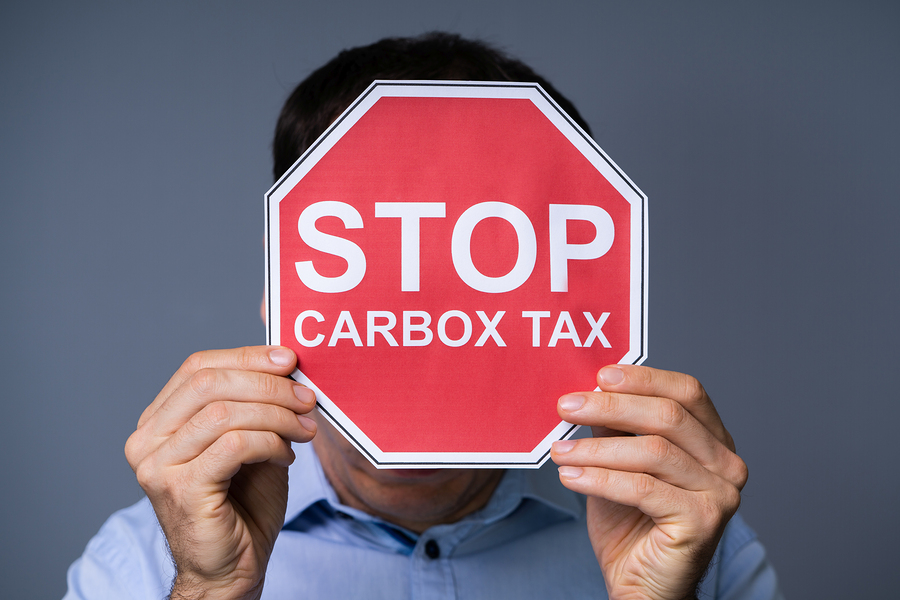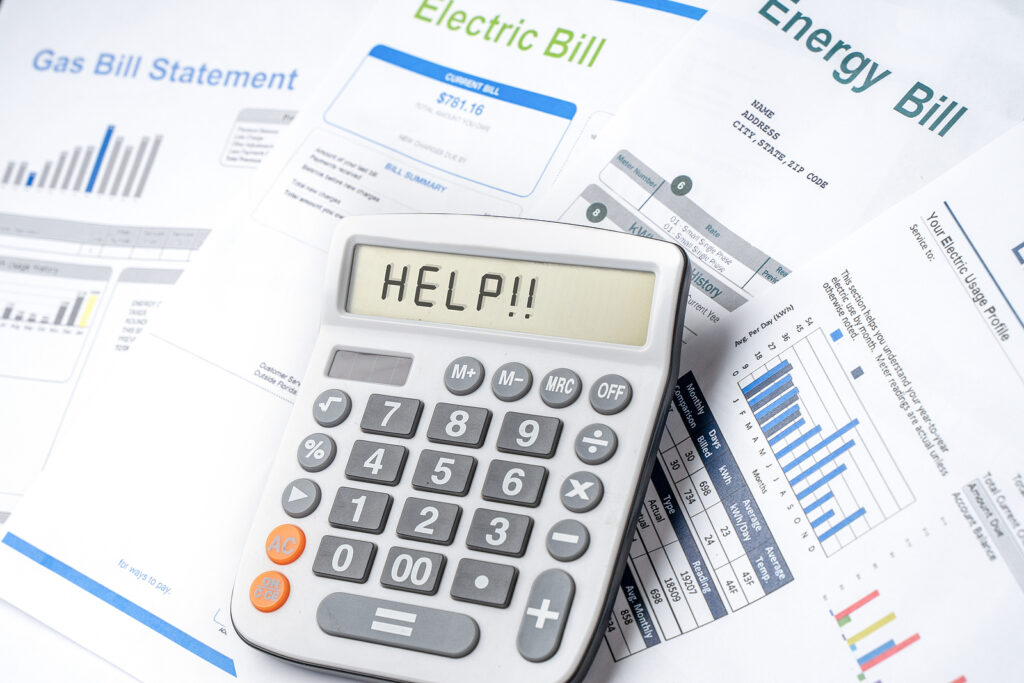Traditional fuels are the backbone of the American economy. Some in Congress want to tax this energy which would impose a substantial burden on Americans’ quality of life by significantly raising gasoline and energy prices.

The PROVE IT Act is a backdoor attempt to impose carbon dioxide taxes on the American public without so much as an up or down vote. After initially being listed as a possible supporter of the PROVE IT Act, Congresswomen Miller-Meeks has recently raised serious concerns about the bill potentially being tied to a carbon tariff. This has been AEA’s central concern all along. The PROVE IT ACT creates a database containing the greenhouse gas emissions of specific products that might appear harmless.
However, the stated intentions of many of the bill’s supporters is to use the data gathered by the PROVE IT Act to implement carbon tariffs and taxes. This change of heart is a welcomed development as the American people know that any tax on imported goods will be paid for by families and businesses, not Chinese companies.
If Rep. Miller-Meeks opposes carbon taxes, then she should clarify her opposition to the PROVE IT Act and reject this, or any legislation, that would lead to a national energy tax.
What You Can Do:
We need YOU to deliver this important message to YOUR member on Capitol Hill. You can do this through our easy-to-use advocacy system by filling out the form below. (It may take a few seconds to load—thanks for your patience!):
- Send an email directly to Miller-Meek’s office in Washington D.C. either using our pre-drafted message, or writing your own letter to the Congresswoman encouraging her to remain steadfast in her support for affordable energy
- Call the Miller-Meeks Congressional office and tell her yourself what a tax on energy would mean for your family and why her opposition to the bill is critical to stopping an energy tax in America, or contact her in district office at (563) 232-0930
- Tweet at Miller-Meeks and show her and her followers more information explaining the dangers of this tax scheme and why it is so important she holds the line
What You Need to Know:
The PROVE IT Act mandates the Department of Energy (DOE) to assess the greenhouse gas emission intensities of 22 traded goods categories manufactured by both US and foreign companies. Additionally, the bill grants DOE the authority to evaluate the emission intensities of any other product category listed in the US harmonized tariff schedule (HTS). This encompasses hundreds of categories.

Currently, Rep. John Curtis (R-UT) is seeking support from Rep. Miller-Meeks and others for a House version of the PROVE IT Act. While it’s no shock to witness Democrats embracing policies prioritizing climate change without much heed to cost or efficacy, it’s disheartening to witness Republicans aiding them in this endeavor.
A faction within the Republican Party is eager to impose protectionist trade policies that might benefit a small number of companies in their districts. These Republican members know energy taxes are not popular, so they have obscured their efforts to hike energy prices behind rhetoric about being tough on China. In the process, they are finding common ground with a segment of the Democratic Party that is focused on supporting climate action in any form.
Rep. Curtis has a long history of supporting actions that would harm American energy consumers.
- February 26, 2020 – Rep. Curtis Encourages Bipartisan Efforts to Reduce Carbon Emissions
- November 19, 2020 – Worldwide Wind Turbines Act
- Curtis in 2021 launched the Conservative Climate Caucus and remains its chair. He recently traveled to the U.N. climate talks in Dubai, United Arab Emirates, to push permitting overhaul; is co-chair of a bipartisan wildfire caucus; and has backed the Biden administration on solar policies.
- Co-Sponsor: H.R.2820 – Growing Climate Solutions Act of 2021- Entities eligible to participate in the program are (1) providers of technical assistance to farmers, ranchers, or private forest landowners in carrying out sustainable land use management practices that prevent, reduce, or mitigate greenhouse gas emissions, or sequester carbon; or (2) third-party verifiers that conduct the verification of the processes described in the protocols for voluntary environmental credit markets.
- Co- Sponsor H.R.9318 – CREST Act of 2022 – The bill establishes a five-year pilot program under which DOE must purchase from certain facilities carbon dioxide removed from the atmosphere or upper hydrosphere.
- September 9, 2023 – Carbon Tariff bill – Reps. John Curtis (R-Utah) and Scott Peters (D-Calif.) will be the lead sponsors of a House version of the “PROVE IT Act,”
- “I’m pleased to be working with Representative Peters on what we call the Prove It Act, which would be a government study that would actually demonstrate in all of these sectors where we are leading, maybe where we’re weaker in a couple of areas, but where we’re leading so that we have actual facts when we’re sitting with China and talking about the discrepancy that we’re putting on U.S. businesses and when the CBAM is put into effect, we’re not using Europe’s numbers. We’re using our numbers.”
- September 26, 2023 – Co- Sponsor of HRes726: Supporting the designation of the week of September 25 through September 29, 2023, as “National Clean Energy Week”.
- October 17, 2023 – Methane Emissions Reduction Act – This effort was tried in the IRA which had opposition from the majority of the Conservative Climate Caucus.At the time, Curtis said he needed to “better understand methane.”
- In October, Curtis launched his own effort to curb methane emissions with a bill, H.R. 5964, the “Methane Emissions Reduction Act.” It is a more modest effort than a fee imposed on producers in the 2022 Inflation Reduction Act, which Curtis has sought to repeal.
Why shouldn’t we study this?

Opponents of the PROVE IT Act aren’t asserting that the bill directly authorizes a carbon tax. A database containing the greenhouse gas emissions of specific products might seem harmless, but it will open the door to overreach and lead to future carbon tariffs and taxes.
The PROVE IT Act sorts products based on their Harmonized Tariff Schedule, laying the groundwork not just for carbon tariffs but also domestic carbon taxes. To comply with international trade rules, any adopted carbon tariff would necessitate a matching domestic carbon tax by law, so providing lawmakers with an emissions database sets the stage for both. Giving unelected officials power to judge business data will lead to abuse, like exaggerating the carbon intensity of some products and downplaying others. Manipulating government data to benefit some interests over others is standard practice in energy and environmental policy. For example, the Environmental Protection Agency’s use of social cost of carbon estimates fluctuates based not on scientific measurement, but rather to drive the policy preferences of the administration in charge. There is no reason to believe that data measuring the emission intensity of various products as outlined in the PROVE IT Act will not be abused in a similar way.
How do we know this will lead to new taxes?
PROVE IT Act proponents claim that supporting the bill doesn’t imply backing carbon tariffs and taxes.
However, the organizations backing the bill are largely supportive of it because they see it as a vehicle that will lead to new energy taxes and many outlets have laid out the path the PROVE IT Act creates for a carbon tax. Furthermore, backers of the bill have alluded to the fact that it will lead to some form of carbon taxation. Since 2021, many of the sponsors of the PROVE IT Act have sponsored bills imposing carbon taxes on imports, often coupled with domestic carbon tax measures. Senator Coons (D-DE) said “figuring out a fair process for imposing tariffs on countries that don’t have any transparency around their emissions is also going to be a complex part of any border carbon adjustment mechanism.” Senator Sheldon Whitehouse (D-RI) expressed confidence in the bill’s ability to create new energy taxes when he stated “it will help us construct a carbon border adjustment of our own.”
Senator Kevin Cramer (R-ND) has advocated for collaboration with the European Union to impose new carbon tariffs and taxes. He wrote, “We have an opportunity to counter Putin’s playbook with a bold initiative consistent with European priorities… One aspect of that initiative could be a joint trade mechanism between the United States and the European Union that levels a common carbon fee on imported goods.”
Furthermore, at Politico’s 2024 Energy Summit, Cramer stated that, “a lot of my friends on the right see it as the first step, or the next step, to a carbon border adjustment mechanism of our own, and others as a domestic carbon tax, and, well, to which I say, if someone is going to do that, I’d rather have them have good data than some arbitrary number.”
He went on to say: “I think that’ll be an interesting one because you do have in President Trump somebody who is clearly not opposed to tariffs, somebody who sees trade as an opportunity to leverage America’s excellence against others mediocrity, and he and I have talked about Prove It, actually, earlier this year, just the two of us together, and, well um, he said ‘you know, I like tariffs.’ I said well I’m not talking about tariffs, I’m just talking about evidence and data to prepare to defend against tariffs. But then he said, ‘carbon is complicated,’ and I said you’re exactly right, it is complicated and we have a communications challenge, but I’m up for that challenge.”
Why would new energy taxes be bad?

Carbon taxes: The reason why the U.S. economy heavily relies on carbon-intensive fuels in its energy and transportation sectors is their reliability and convenience. While a new carbon tax, if severe, could push households and businesses to reduce emissions, doing so would impose a substantial burden on Americans’ quality of life by significantly raising energy prices.
Carbon tariffs: Additionally, tariffs are simply taxes on imported goods, which end up increasing prices for consumers. While some domestic industries may profit from tariffs, overall, they hurt American consumers by making products more expensive. Tariffs shift wealth from consumers to protected producers and the government, as governments collect revenue from tariffs. This could set off a cycle where industries benefiting from these tariffs encourage other domestic sectors to seek protectionism through additional government policies.
What do the American people say?
In December 2023, the American Energy Alliance and the Committee to Unleash Prosperity released a survey on voter attitudes toward climate and energy policies, and we posed this question to 1,600 likely voters in eight swing states: “How much are you willing to pay annually to address climate change?” The median response was $10 per year. Surprisingly, over one-third of respondents, including 17 percent of surveyed Democrats, expressed unwillingness to pay anything at all. Moreover, when confronted with the prospect of a proposed tax on imported goods, voters displayed a resounding opposition, with nearly a 2-1 margin against it. This sentiment was echoed across the board, with a widespread consensus emerging that the federal government should refrain from imposing measures that increase the cost of energy, exacerbate inflation, or escalate taxes on energy. Carbon tariffs and domestic carbon taxes do all of that.
